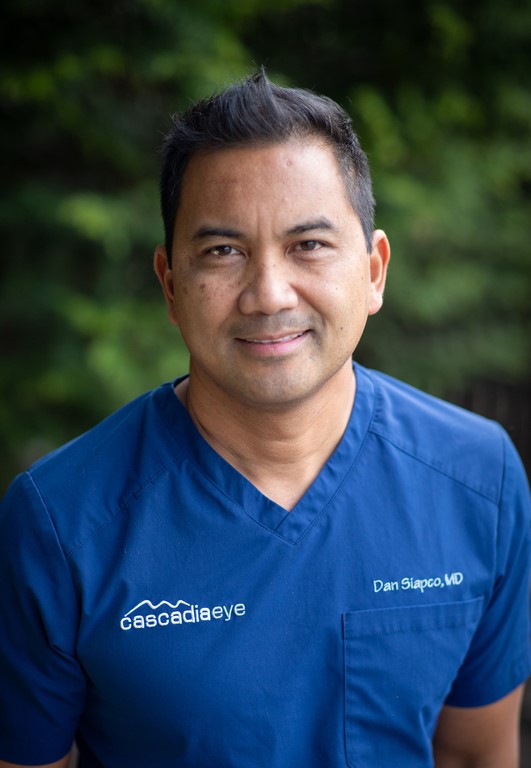Selecting Monovision for Cataract Surgery
Posted in Bellingham, Contact lenses, Eye Blog, Eye-Opening, Eyeglasses, Medical, Mount Vernon, Sedro-Woolley, Stanwood, Surgery, Whidbey
By Dan Siapco, MD
Monovision is a Proven Concept
Cataract surgeons have strategically used the concept of monovision lenses with cataract surgeries for several decades now. It minimizes dependence on glasses, has proven to be extremely safe, and improves results for many patients. But what is monovision?

What is Presbyopia?
Before we proceed, you need to understand a little about presbyopia. Presbyopia is a condition all people go through. It usually starts in people’s mid-to-late forties when they start struggling to look at objects 16 inches from their face or closer. You can think of this condition as a “rite of passage” into middle age. This near vision difficulty can be corrected simply with a pair of “readers,” or in the case of someone with poor distance vision, a bifocal or progressive pair of glasses. Contact lenses can also be used to correct this problem although we won’t be discussing that here.
Monovision Aids Presbyopic Vision
We all have a dominant eye. It is similar to being right- or left-handed. With monovision, the surgeon corrects the dominant eye for distance and intentionally leaves the non-dominant eye nearsighted. The nearsighted eye allows the patient to see up close without glasses and the distance-sighted eye allows the patient to see objects in the distance without glasses.
The brain does the rest and the two images are fused so that they work seamlessly together. Unfortunately, it is not for everyone. There are people who can tolerate monovision and people who cannot. Some individuals are not able to fuse the two images and the eyes seem to “fight” each other. It is really important that the surgeon determines into which camp each patient belongs.
Monovision is a great solution to the problem of presbyopia, and is performed in conjunction with cataract surgery. When a patient has been diagnosed with significant cataracts requiring surgery to replace their original lenses, selecting a monovision lens strategy can also give patients independence from spectacles.

Contact Lens “Test Drive”
Contact lenses are a great way to simulate monovision for a patient. Anyone who has not already experienced monovision with contact lenses is set up for a “test drive” pair to make sure they can fuse the distance and near image.
It typically only takes a day or two for a patient to figure out which camp they belong to. The outcome is usually a strong yes or no. I typically don’t recommend monovision to a patient if they are indifferent to the trial or are unsure.
Monovision is not a new concept to contact lens wearers, although I find that it initially doesn’t sound appealing to patients when I introduce the idea to them. Patients who have tried monovision in the past with contact lenses are excellent candidates for this procedure and almost certainly do well with monovision in lens implants after cataract surgery.
Presbyopic-Correcting Lenses Can Help
I find that although presbyopia-correcting lenses like PanOptics and Vivity offer great outcomes and significant glasses freedom, there is still a place for monovision. It is especially effective in patients who are interested in glasses freedom without the cost associated with the newer presbyopia-correcting lenses.
Talk to your cataract surgeon to see if monovision is a good option for you.

C. Dan Siapco, MD
Comprehensive Ophthalmology
Surgeon
Cataract Specialist
Contact Cascadia Eye
If you would like to learn more, or if you would like to schedule an appointment or consultation with our talented doctors at Cascadia Eye, please contact us today. You may also pre-shop for glasses at our online pre-shopping page any time. Our entire team is committed to protecting and improving your vision and the health of your eyes. We are happy to answer any questions you might have!
In addition, join us on Facebook, Instagram or YouTube to ask your questions about eyes, exams, and our practice. We’d love to hear from you – and there might be a blog to address your questions in the future.


